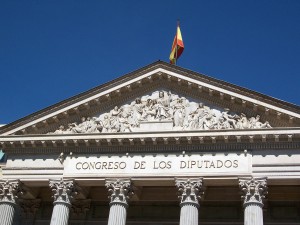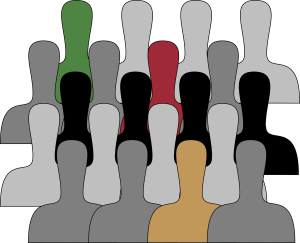Spain is, according to the OECD, the EU member state with greatest inequality between rich and poor ( see OECD Report – In It Together; Why Less Inequality Benefits All ).  However much the disparity has grown in the UK, it’s nowhere near as bad as the disparity in Spain. And the proportion below the poverty line in Spain is much higher, having doubled since the financial crisis ( from being at about OECD average ). The majority of the Spanish population have less, relative to the wealthy, and are now in a more precarious position, economically, than the majority in Britain.
However much the disparity has grown in the UK, it’s nowhere near as bad as the disparity in Spain. And the proportion below the poverty line in Spain is much higher, having doubled since the financial crisis ( from being at about OECD average ). The majority of the Spanish population have less, relative to the wealthy, and are now in a more precarious position, economically, than the majority in Britain.
So it’s unsurprising that it was Spain which saw the birth of the indignados, the mass out-pouring of protest and occupation of main squares in towns and cities across Spain in 2011 and which lead, indirectly, to the Occupy movement in Britain and the US. In Jerez a group occupied Plaza Arenal for some months, handing out  pamphlets and organising discussion and just being there, where their presence couldn’t be avoided. Their grievances were many, but driven, above all, by outrage at the betrayal, as they saw it, of the ordinary person by the political elite, following the exposure of the greed and mendacity of the banking system and the failure of the political class to address and change it. A sentiment shared by many ( and not just in Spain ).
pamphlets and organising discussion and just being there, where their presence couldn’t be avoided. Their grievances were many, but driven, above all, by outrage at the betrayal, as they saw it, of the ordinary person by the political elite, following the exposure of the greed and mendacity of the banking system and the failure of the political class to address and change it. A sentiment shared by many ( and not just in Spain ).
In the UK this sentiment manifests itself, perhaps, in lack of political engagement with the traditional parties and in support for new or outsider parties, UKIP, the Greens or nationalist parties. Younger people support specific causes, interest groups defend their own.
In Spain there was much discussion of whether or not the indignados could be anything other than a protest movement. Turning that outrage and sense of betrayal into positive change and renewal could be political dynamite, so the thinking went. But the thinking also suggested that it wouldn’t happen, the movement was too disparate and it eschewed leaders in the traditional sense. Then came Podemos, a group of leftist, indeed Marxist, thinkers with a new party and a new appeal to voters.
Now polls find Podemos stuck neck and neck with the traditional socialists PSOE while the PP, of the centre right, is just ahead. And Podemos has repeatedly refused to join with other parties of the left to make a coalition e.g. in Jerez, the PP got most votes, even though PSOE and the Podemos backed candidate polled more when put together.
 This month saw the launch of a new national political grouping in Spain – Ahora en Comun ( Now in Common ). It emerges after the recent municipal and regional elections. The first saw major cities, like Madrid and Barcelona ( in Andalucia, Cadiz ), fall to a broad coalition of leftist, social activist groups with people who have previously had no political affiliation. Madrid and Barcelona now have mayors from, respectively, Ahora Madrid ( Madrid Now ) and Barcelona en Comu ( Barcelona in Common ). These groups were given broad support by Podemos, but they weren’t Podemos.
This month saw the launch of a new national political grouping in Spain – Ahora en Comun ( Now in Common ). It emerges after the recent municipal and regional elections. The first saw major cities, like Madrid and Barcelona ( in Andalucia, Cadiz ), fall to a broad coalition of leftist, social activist groups with people who have previously had no political affiliation. Madrid and Barcelona now have mayors from, respectively, Ahora Madrid ( Madrid Now ) and Barcelona en Comu ( Barcelona in Common ). These groups were given broad support by Podemos, but they weren’t Podemos.
About 200 people began a petition calling for a new approach and it has garnered 27,000 signatures so far. The movement recently received a boost when 120 leading cultural figures in Spain, including Pedro Almodovar, the film director, signed an open letter calling on people to support it. It says its first objective is to get 30,000 signatures, then 50,000 and then to contest the national election due this year using broad coalitions like Ahora Madrid and Barcelona en Comun. So far Podemos is keeping its distance, but, with the left already split, Ahora en Comun is offering something new, it claims, a coalition with broad support. They state –
We believe that it’s both possible and essential to put that which unites us ahead of our differences in order to reach an agreement on a number of common sense issues that reflect the social consensus of our time: the need to recover our sovereignty, to regenerate and enhance democracy, to reclaim the integrity and transparency of our political representatives, to defend the universality of human rights (education, healthcare, food, housing and employment) and to establish dignity, equality, participation and justice as basic principles of the new way of doing politics that 21st century challenges and opportunities demand.
Who can disagree with that? ( If you’re not totally wedded to free market capitalism. ) What that means in terms of policy, who knows. How Ahora en Comun would deal with an international financial system which transcends national borders, and demands austerity, who knows. But at least people are being engaged. Rather more than in the UK. Maybe times aren’t yet hard enough? Watch this space.
If you enjoyed reading this blog piece try ‘When I was a Child…‘


 RSS – Posts
RSS – Posts
Pingback: Ahora Almodóvar: Spanish filmaker calls for radical political change » Mediapolitics